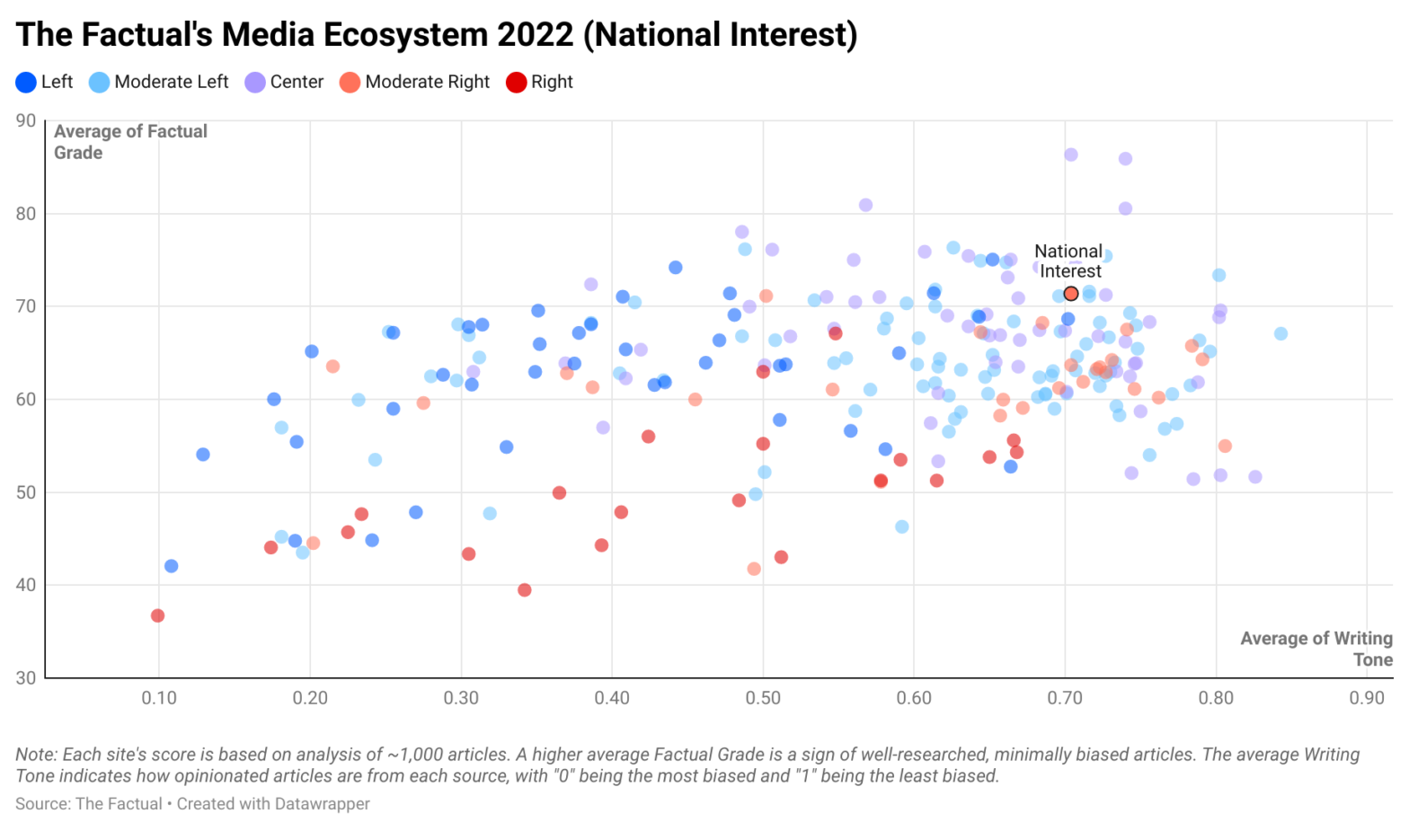The National Interest is a bimonthly international relations magazine owned by the Center for the National Interest, a think tank formerly known as the Nixon Center for Peace and Freedom. The magazine is generally regarded as slightly conservative, largely due to its support for the realist school of thought. Realism, contrasting with liberalism, “emphasizes the competitive and conflictual side of international relations,” and the magazine attempts to distance itself from “liberal hawks and neoconservatives.” So, how reliable is the National Interest?
Please check your email for instructions to ensure that the newsletter arrives in your inbox tomorrow.
How Does The Factual Rate News Sources?
The Factual analyzes more than 10,000 news stories every day to help readers find the most informative, least-biased articles. Our news-rating algorithm scores each article along four metrics: (1) cited sources and quotes, (2) publication history, (3) writing tone, and (4) author expertise. These scores combine in a weighted average we call a Factual Grade, which ranges from 0–100%. (See our How It Works page to learn more about our algorithm.)
For this study, we analyzed ~1,000 articles each from 240 news sources. The average Factual Grade for the entire dataset was 62.5%. Based on these averages, we can compare the performance of news sites across the media ecosystem. The entire dataset can be explored in greater detail here.
How Factual Is the National Interest?
The National Interest scored an average Factual Grade of 71.4%, placing it in the 89th percentile of our dataset. In fact, it is the highest-scoring right-leaning news source in the dataset and the 27th-highest scoring site overall.
The magazine’s high average is due to a number of factors. First and foremost, articles tend to incorporate numerous, high-quality links from reliable sources, a sign that the site maintains high standards for sourcing of information. Likewise, the magazine’s authors exhibit high levels of topical expertise, meaning they routinely write high-scoring articles on the same topic areas. Lastly, articles are generally written in a highly neutral tone.
Like any news source, scores for articles from the National Interest varied widely based on factors like author expertise and cited evidence. For example, some scored above 80%, while others scored below 60%.
How Opinionated Is the National Interest?
One of the metrics The Factual uses is the Writing Tone, which measures how opinionated the writing is in an article. For this metric, the algorithm looks for signs of subjective commentary (e.g., first person pronouns and unnecessary adverbs), as well as the emotional nature of selected words, and sees how prevalent they are for a given length of text. More neutral text receives higher ratings, with “0” being the most opinionated and “1” being the most neutral.
The National Interest had an average Writing Tone score of 0.70, placing it in the 75th percentile in our dataset for this metric. This suggests that articles from the magazine tend to use a largely neutral writing tone. This can be seen in headlines such as “Rising Oil Prices Ends Fall in Gas Prices” and “The Chinese Air Force May Be Getting a Hypersonic Drone.”
What Is the National Interest’s Political Bias?
The Factual classifies news sites by political bias as either Left, Moderate Left, Center, Moderate Right, or Right. This classification comes from third-party assessments from media bias organizations such as AllSides and Media Bias/Fact Check (MBFC). Based on this data, The Factual assigns the National Interest a Moderate Right bias.
MBFC assigns the National Interest a “Right-Center” due to the magazine’s “story selection and political affiliation that leans right.” The magazine receives credit for highly researched articles and ample sourcing, as well as a clean fact-check record. As MBFC puts it, the site is only classified as having a rightward leaning because it tends to “reject liberal ideology regarding foreign affairs.”
AllSides classifies the magazine as “Center,” based on independent research and 690 community reviews. However, AllSides offers no explanation for this rating and does not appear to have conducted an in-depth review of the magazine to date.
Furthermore, the National Interest indicates its desire to support a “fresh debate” about American foreign policy, by “featuring a variety of leading authors from government, journalism, and academia, many of whom may at times disagree with each other.”
Please check your email for instructions to ensure that the newsletter arrives in your inbox tomorrow.
Who Owns the National Interest?
The National Interest is owned by the Center for the National Interest. Originally known as the Nixon Center for Peace and Freedom, this public policy think tank was established by former President Nixon in 1994 to “serve as a voice for strategic realism in U.S. foreign policy.” It has since been renamed, in part due to Nixon’s problematic legacy. The center describes itself as non-profit and non-partisan and boasts a bipartisan board of directors. Notably, however, the think tank hosted former President Trump’s first major foreign policy address and was entangled in the investigation into Russian interference in the 2016 presidential election. The center was cleared of any wrongdoing, but critics have argued that the center and the National Interest are “two of the most Kremlin-sympathetic institutions in the nation’s capital.”
Why Does It Matter?
News articles always have some bias because all authors have some frame of reference within which they describe a story. Political bias ratings are helpful in understanding this framing. However, it can be more beneficial to know how factual an article is based on quantifiable metrics that can be seen across the media ecosystem, such as cited evidence, author expertise, and writing tone. This is what The Factual ascertains.
Reading several, highly rated articles from across the political spectrum helps counter the bias of any news source or story. To have the day’s most factual news stories delivered to your inbox every morning, subscribe to our daily newsletter.
Article updated on September 19, 2022 to reflect new data.

